The book is specially designed to investigate what skills and strategies are required in writing and speaking modules that distinguish the IELTS proficiency levels. There are a number of factors like Word Stress, Intonation, Rhythm and Cohesive Devices, which is required on behalf of the IELTS candidate in order to determine their assessment over four band scales: Fluency, Grammatical Range and Accuracy, Lexical Resource and Pronunciation. But how to attain all these skills is still a matter of discussion. Without understanding these technical aspects of English language, it is difficult for the IELTS candidate to score better in IELTS Speaking Test as this is the criteria for their oral proficiency. In non-native English country like India and China, no preference is given to learn all these skills. Only few study materials are provided to them to memorise the answers. No preference is to be laid in building of Rhetoric among the candidate. The major objective of the book is:
 Making the IELTS candidate proficient in speaking test by teaching them all the Rhetorical devices like Word Stress, Intonation, Rhythm, Cohesive Devices, Fluency, Lexical Resource, etc.
Making the IELTS candidate proficient in speaking test by teaching them all the Rhetorical devices like Word Stress, Intonation, Rhythm, Cohesive Devices, Fluency, Lexical Resource, etc.
 All these techniques should be properly designed and provided to the students in the form of study materials.
All these techniques should be properly designed and provided to the students in the form of study materials.
 Sound recorder (self-created by students in mobile phones) software should be used to maintain the Rate of Speech in the IELTS Speaking Task 2
Sound recorder (self-created by students in mobile phones) software should be used to maintain the Rate of Speech in the IELTS Speaking Task 2
 Speech therapies should be given to the students to twist their tongues in L2.
Speech therapies should be given to the students to twist their tongues in L2.
In 2001, the IELTS interview format and criteria were revised. A major change was the shift from a single global scale to a set of four analytical scales focussing on different aspects of oral proficiency. This study is concerned with the validity of the analytical rating scales. It aims to verify the descriptors used to defne the score points on the scales by providing empirical evidence for the criteria in terms of their overall focus, and their ability to distinguish the levels of performance.
The Speaking Test Band descriptors and the criteria key indicators were analysed in order to identify the relevant analytic categories for each of the four band scales: fluency, grammatical range and accuracy, lexical resource and pronunciation.
Speaking Skills Checklist is as follows:
Production Skills, Pronunciation: Rhythm, Number & Length of Pauses, Stress, Intonation, Contours.
Communication Skills: Fluency, Clarity, Coherence, Confidence, Cultural Appropriateness, etc.
Language Skills: Grammatical Accuracy, Grammatical Range, Vocabulary
But how an IELTS student will build these skills is still the matter of discussion. The IELTS Books/Instructors or even the organization of IELTS are silent in this matter. No doubt, we can get this matter by netsurfing over different websites but what about the authenticity of the study material. The main problem in a non native English country like India is that how students twist their tongues in L2 (English language) because while learning, they automatically get the infiuence of L1 (Mother Tongue) because it is their native language, and this is natural, so nobody can avoid it. But learning global (English) language with the help of Vocal Cosmetics/Rhetorical Devices will improve their tongue twisting into L2 (Second Language Acquisition) which automatically improve the proficiency of the candidate in the IELTS Speaking and Writing Test.
Keeping this viewpoint in mind, I have decided to put forth some technical aspects of learning, writing and speaking English through the medium of this book.This will truly help the students to speak good and perfect English.
ABSTRACT
INTERVIEW SESSION
In this part, simple warm up questions based on candidates names, place of residence, leisure, preference, etc. are asked. It consists of 7 to 8 questions. This part covers the most popular 50 Interview Questions which are generally asked by the IELTS instructors. In exam this section is divided into two categories, i.e., phase A & Phase B. Phase A has 4 questions which are related to Hometown, study & work & Phase B has another 4 questions related to Leisure, Hobbies, Food, Friendship, Shopping etc.
MOST POPULAR 50 QUESTIONS (INTERVIEW SESSION)
INTERVIEW SESSION
1.What is your full name ? What should I call you?
Ans. My name is Ankit Bhardwaj. You can simply call me ANKIT.
2.Can I see your ID?
Ans. Sure . Please.
FAMILY
3.Tell me something about your family?
Ans. Well.. I belong to a simple, small and nuclear family. I am living with adorable parents and two small sisters. All coordinate with one another and live happily. I must say God has blessed me with A CLOSE KNIT FAMILY
4.What do you like doing most with your family?
Ans. I like to have long meals, amusement, fun and frolic, would like to tease my sisters, sharing griefs and sorrows with them. These is a common saying The family which eats together, lives together and laughs together is truly a close knit family.
5.Who are close to you in your family?
Ans. Well I am very close to my mother, A true picture of maternity. She cooks what I wish to eat. She loves and teaches me what is good or bad for me. She is really a very virtuous lady with the blend of passionate feelings of a child. I wish to salute this real role model and admire this wonderful creation of God on this planet.
6.In what way is your family important to you?
Ans. My family is everything to me. My family members are my best friends and they support me in every real challenge of my life. I know they are always with me, no matter what. They are not only my best friends, but we truly are tied with strong bonds of respect, unity and strength. Thats why I used to say my family is my real earned wealth and strength.
WORK
7.Do you work or are you a student?
Ans. I am a very hardworking person. Presently, I am doing both the tasks simultaneously. In the morning hours, I usually go for my orientation classes of language as I am fond of learning linguistics and in the afternoon, I am working as an executive in a reputed company.
8.What are your responsibilities at work ?
Ans. My responsibilities include keeping an eye upon the junior executives for maintaining organisational goals and objectives and so keeping supervision over them, checking their targets as well as maintain coordination and proper communication is my main work. Thorough commitment to work is my first and last responsibility towards work.
STUDY
9.Do you work or are you a student?
Ans. I am a student at the moment. I am studying English Linguistics and literature together and hoping to get more and more excellence in this field.
10.Why do you choose that course or job?
Ans. Honestly speaking, as everyone knows English is a global language. It serves both socially as well as professionally. Because what I believe socially, it is the order of the day and professionally it is A Bag of Handsome Perks & Incentives.
11.What is the most difficult thing about your studies or job?
Ans. The most difficult thing about my studies is its grammatical rules and lexical part. Its really difficult to remember high profile words and proverbs. Moreover, grammatical rules limits my tendency to learn the things.
12.What type of study most of the students prefer these days?
Next page
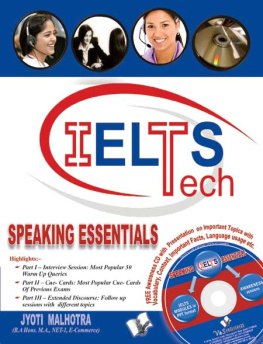
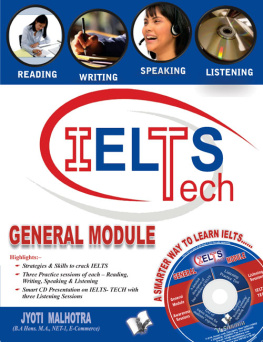
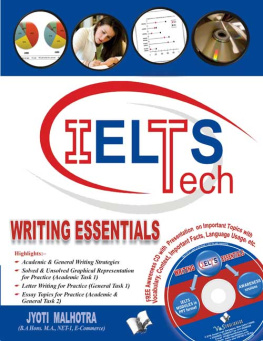
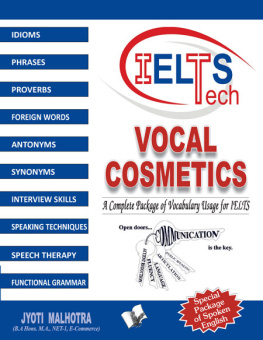
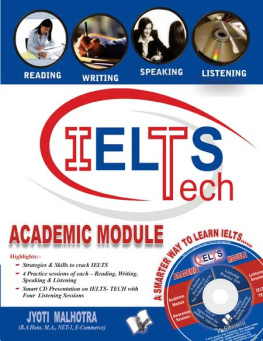
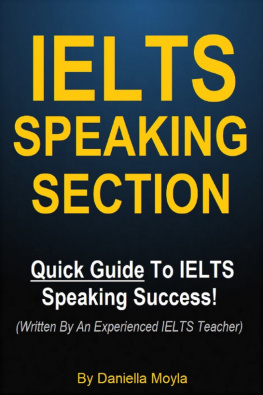
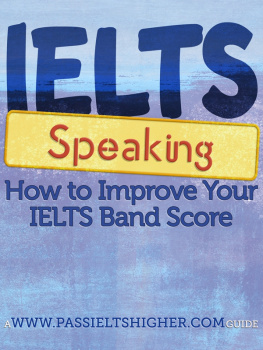

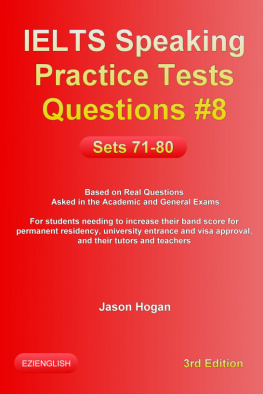
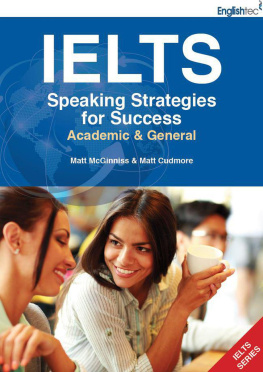
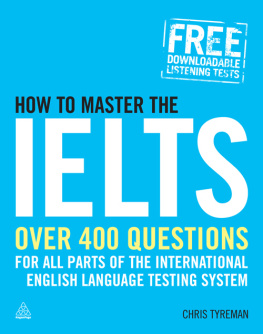
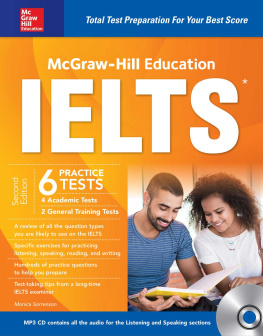

 Making the IELTS candidate proficient in speaking test by teaching them all the Rhetorical devices like Word Stress, Intonation, Rhythm, Cohesive Devices, Fluency, Lexical Resource, etc.
Making the IELTS candidate proficient in speaking test by teaching them all the Rhetorical devices like Word Stress, Intonation, Rhythm, Cohesive Devices, Fluency, Lexical Resource, etc.